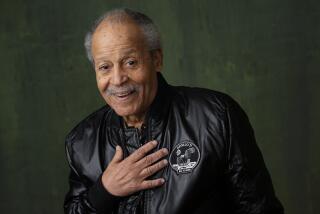Gherman S. Titov; Cosmonaut Was Second Man to Orbit Earth
- Share via
MOSCOW — Russia’s towering cosmonaut hero Gherman S. Titov, the second man in orbit and the first to stay in space more than a day, died Wednesday while taking a sauna in his Moscow apartment. He was 65.
Titov, who was considered Russia’s greatest living space legend, died of carbon monoxide poisoning. Police were treating his death as accidental, although no reason was given for the presence of the gas in the sauna.
Titov was part of the 20-member team of test pilots who trained at Star City near Moscow in preparation for the first manned spaceflight in 1961. Each desperately hoped to be the first person in space.
After the team was slimmed down to six, Titov and Yuri A. Gagarin were the obvious front-runners, cosmonaut instructor Cesar Solovyov said in a 1996 interview. Titov was brighter, more inquisitive and more active, even reciting poetry in the training chamber, Solovyov said, but became backup cosmonaut for the pioneering flight, in part, because Gagarin had a winning, handsome smile.
News reports of the day said Titov was so delighted to hear that Gagarin had been selected that he jumped for joy, hugging and kissing his comrade.
But the reports were untrue, Titov said many years later. “Of course I didn’t jump into his arms. I just stood there for a few moments. I understood quite well that I had the same training level as Gagarin. Naturally, I was disappointed. Until the last moment I had hoped to be the one,” he said in the interview, in 1996.
The decision to send Gagarin into space in the Vostok 1 craft was announced just days before the April 12 launch, but it was not until two days after the 108-minute flight that Titov understood that the feat had made Gagarin immortal.
“The historical significance became clear only on April 14, when we were invited onto [Moscow’s] Red Square and I saw an ocean of people screaming, smiling, all happy, singing songs,” he recalled in an interview last year.
Missing out on the first manned flight was a lifelong regret, but the disappointment gradually ebbed. It did not mar a highly distinguished career in the Soviet space industry.
During his own flight in August 1961, the 25-year-old Titov orbited the Earth 17 times in the Vostok 2 and was in space for 25 hours and 18 minutes. He was the first man to sleep in space. He was also the first to experience space sickness, though he concealed the fact from mission control during the flight.
“He was the living symbol of Russian achievements in space,” a close friend, Alexei A. Leonov, told The Times on Thursday.
“But sometimes he couldn’t conceal his true feelings about it; sometimes he would reveal a kind of sadness that he was the second and not the first,” said Leonov, the first man to walk in space.
Between the first two Soviet flights, U.S. astronauts Alan Shepard and Virgil “Gus” Grissom managed 15-minute suborbital flights.
After Gagarin’s death in a plane crash in 1968, Titov became the Soviet Union’s greatest surviving cosmonaut. Unwilling to risk the death of another hero, authorities canceled a planned second mission for Titov, another cause for regret.
Titov was born Sept. 11, 1935, in the Altai Territory near Kazakhstan. After his space mission he continued to test-fly aircraft, among them the MIG-21, 23 and 27.
He was appointed deputy chief of a space research and design institute in 1972, joined the Defense Ministry in 1976 and went on to become first deputy commander of Military Space Forces, retiring in 1991.
Titov was elected to the lower house of parliament in 1995 as a Communist Party delegate. He wrote several books on spaceflight and was awarded the highest Soviet award, Hero of the Soviet Union.
Titov’s father was a village teacher who imbued his son with a passion for literature and music.
“Gherman Titov knew by heart almost the whole of [Alexander] Pushkin’s works. He knew lots of poems by other poets as well. He was one of the most well-read people I have ever met,” Leonov said.
“We were great friends; we understood each other totally,” he added. “I will never forget our parties with him and the joy his presence gave to others and to me. He made wonderful jokes, recited poetry and sang songs.”
More to Read
Sign up for Essential California
The most important California stories and recommendations in your inbox every morning.
You may occasionally receive promotional content from the Los Angeles Times.










